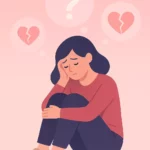Table of Contents
You replay it again in your mind—the last text, the unspoken words, the way they walked away without turning back. There’s a hollow ache where clarity should be.
Maybe you’ve even drafted a message in your head a hundred times, something that might make them explain why, or say they’re sorry, or admit they still care. But every time, the thought of reaching out feels heavy, dangerous.
You wonder: How do you heal when the other person won’t give you the closure you need?
What if the answer isn’t waiting for them at all? What if you could write your own closure letter?
Why does it feel impossible to get closure after a breakup?

Your brain is wired for stories. It craves beginnings, middles, and satisfying ends. When a relationship ends abruptly—or with too many unanswered questions—your mind keeps circling the incomplete narrative like a song stuck on repeat.
Psychologists call this “rumination.” Palacio-González and colleagues (2017) found that vivid positive memories of the relationship, combined with uncertainty about why it ended, can trap people in emotional turmoil.
To your nervous system, heartbreak isn’t just emotional—it’s physical. Brain scans have shown heartbreak lights up the same pain centers as a burn or a broken bone.
And so, we wait. For a text. For an apology. For that elusive final conversation. But waiting gives away power. It keeps healing tethered to someone who may never provide the answers we crave.

Why Breakups Hurt So Much (Science of Heartbreak & Healing)
Let’s examine breakups in: Biology of love & loss, Attachment styles, Rejection psychology, Closure, Rumination, Grief
Tap here to read more →Can writing your own closure letter actually help you heal?
The good news is: your mind doesn’t need the other person to finish the story. It needs you.
In a landmark study, James Pennebaker discovered that writing about deep emotional pain—even for just 15 minutes a day over four days—lowered participants’ stress, improved their immune function, and led to fewer visits to the doctor.
Later research by Lewandowski (2008) showed that people who wrote with a focus on positive emotions after a breakup felt stronger and coped better than those who simply journaled neutrally.
Why? Because writing pulls the chaos out of your head and gives it shape on paper. It lets you say the things that feel unsayable. You don’t have to censor, please, or fear judgment.
The act itself is a quiet declaration: I am choosing to heal, even if they never say another word.
What should a closure letter include to be effective?

Think of your letter not as a message to your ex, but as a ceremony for your own heart. A way to gather the fragments of your story and place them gently on the page.
- Acknowledge the reality of the relationship—its beauty, its flaws, its end.
- Speak the unsaid. Let out anger, grief, gratitude, and even love. All of it belongs here.
- Recognize your growth. What did you learn about love? About yourself? About what you’ll never settle for again?
- Release them. Write a clear, powerful statement that you are letting go and stepping into your future untethered.
The letter doesn’t need to be sent. In fact, keeping it private often makes it more honest and cathartic.
This is for you. It’s a symbolic act of agency—a way to close the chapter with your own hand.
Remember: Closure is an inside job
Closure isn’t something someone else grants you like a gift. It’s something you create, gently and deliberately, within yourself.
And sometimes, all it takes to begin is a blank page, a pen, and the courage to say what you need to say.
FAQ
Q1. What is a closure letter, and how does it help after a breakup?
A closure letter is a personal, unsent letter you write to your ex or yourself to process emotions and create a sense of resolution. Research shows expressive writing helps reduce stress, improve clarity, and support emotional healing after heartbreak.
Q2. Should I send the closure letter to my ex or keep it private?
It’s usually best to keep your closure letter private. The purpose is to release your feelings and gain clarity for yourself, not to reopen communication or seek validation from your ex.
Q3. What should I include in my closure letter?
Focus on acknowledging the relationship, expressing unsaid emotions, recognizing personal growth, and making a clear statement of letting go. This structure helps you process your story and move forward.
Q4. Can writing a closure letter really help me move on?
Yes, writing a closure letter can be a powerful step in moving on. Studies show that even unsent letters help quiet rumination and create emotional release, making it easier to heal and reclaim your sense of self.
Scientific Sources
-
James W. Pennebaker, Sandra K. Beall (1986): Confronting a traumatic event: toward an understanding of inhibition and disease
Key Finding: Expressive writing about emotional trauma significantly reduced stress and improved physical health in participants.
Why Relevant: Supports the idea that writing a closure letter helps process breakup pain and promotes healing.
https://ir.library.illinoisstate.edu/cgi/viewcontent.cgi?article=1000&context=fpsa -
Gary W. Lewandowski Jr. (2008): Promoting positive emotions following relationship dissolution through writing
Key Finding: Positive emotion-focused writing after a breakup enhanced emotional coping more than neutral writing.
Why Relevant: Suggests that reframing through a closure letter can help foster resilience and aid recovery.
https://www.researchgate.net/publication/232946681_Promoting_positive_emotions_following_relationship_dissolution_through_writing -
A. del Palacio‑González, D. A. Clark, L. F. O’Sullivan (2017): Distress severity following a romantic breakup is associated with positive relationship memories among emerging adults
Key Finding: Higher distress was linked to vivid positive memories and lack of clarity about breakup reasons.
Why Relevant: Highlights the importance of creating clarity—writing a closure letter can help reduce emotional pain.
https://doi.org/10.1177/2167696817696072
- Rewriting the Story: The Transformative Power of Self-Closure

- The Ultimate Guide to Emotional Detachment Without Closure

- Closure After a Breakup: The Shocking Truth Experts Reveal

- The Surprising Psychology of Unanswered Questions After a Breakup

- The Healing Power of a Closure Letter: How to Let Go and Move On


Leave a Reply